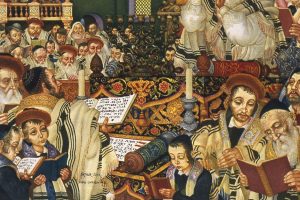The Nuns & Nones origin story is almost disappointingly practical. In 2016 Santa Fe-based minister Wayne Muller visited retreat centers of women religious in the Midwest shortly after he led a retreat for 25 Millennials involved in social justice work—a growing group of young adults who considered themselves spiritually oriented but not affiliated with a specific religion (aka “Nones”).
One of the women religious told Muller that their site was most likely doomed to be torn down, the land sold. “I thought about the people I had just been with and said, ‘There’s somebody you should talk to before you do that,’ ” Muller says.
Muller consulted with Adam Horowitz, a Philadelphia-based activist he met at a Millennial-focused interfaith project at Harvard Divinity School. “Let’s bring them together—let’s see what happens,” Horowitz remembers Muller suggesting.
In late 2016 a group of women religious and religiously unaffiliated Millennials met at Harvard Divinity School to explore the concept of the two groups regularly meeting, working, and perhaps one day cohabitating in the spirit of service and community.
Other investigative meetings around the country followed, and now Nuns & Nones convene regularly in the Bay Area; Kalamazoo, Michigan; Grand Rapids, Michigan; Philadelphia; St. Louis; and other parts of North America, with field trips to one another’s homes and work spaces, weekend retreats, and video-conference discussions of shared readings.
From an unlikely pairing—Muller is a minister in the United Church of Christ and Horowitz, who is Jewish, professes to have never met a sister until “two years ago”—sprang a connection between women religious and religiously unaffiliated Millennials that surprised everyone involved. “Both sides fell in love,” says Horowitz. “There was this sense of seeing and being seen. From there, everyone asked ‘How can I meet the nuns near me?’ ”
An immediate connection
Milicent Johnson was a None in search of a role model. At what she calls an “existential dinner party,” the San Francisco resident and her fellow Millennial friends discussed a shared longing to make connections with their elders.
“We don’t have church anymore. We don’t have institutions where people of different backgrounds come together. We named ourselves ‘feral children’ who were making our way through the world who wanted social justice,” says Johnson, who is San Francisco’s planning commissioner.
When Johnson learned about Nuns & Nones she was intrigued, even though she says “I didn’t have any reference point for women religious. I conjured up images of Sister Act. But I loved the idea of interacting with folks who I thought would be wholly different from me and building a relationship across generations.”
She woke up tentative the morning of her first meeting, but she says the connection was immediate. The group, she says, was immediately willing to share personal experiences “with a level of authenticity and vulnerability that’s just rare in life in general.”
“We all arrived a little hesitant, looking at each other. Then we formed a big circle,” Dominican Sister Gloria Marie Jones of the Dominican Sisters of Mission San Jose recalls of the first Nuns & Nones meeting she was invited to. The group addressed the topic, “What are the deepest questions of your heart?”
Like Johnson, Sister Jones was surprised by how quickly both groups opened up. “I was moved by the insight that emerged from these Millennials sharing their life experiences, what they’re searching and hoping for, and what they care about,” she says. “There was a connection of ‘You too,’ ‘Aha,’ and ‘Oh, that’s important to me, too.’ ”
Dominican Sister Barbara Hansen, who takes part in Grand Rapids-area Nuns & Nones meetings, says that initially her fellow sisters were anxious that the Nones might think the sisters saw the encounter as an opportunity for proselytizing, as she says, “getting everyone in the convent.” Instead, she says, she met a group of young people searching for an intergenerational community. “They wanted the wisdom of people who had lived life a lot longer than they had, who had a sense of shared values and come out of a community which they are seeking.”
Horowitz says this hesitancy followed by embrace is typical of most Nuns & Nones meetings. “Eek! I’m too old for Millennials. I have nothing to offer,” he says most sisters say prior to their first meeting, followed by “Surprise: We’re soulmates.”
“They saw themselves in the other in powerful ways,” says Muller, who has facilitated spiritual group meetings for over 40 years. “The level of mistrust dropped faster than any group I’ve seen before.”
Liberated women
The women religious and Millennials don’t gloss over their differences. Some groups tackle the topic of gender and sexuality head on, which can be tricky even under secular circumstances. Sister Hansen recalls a book discussion on the topic of sexual orientation that didn’t go as hoped. “It didn’t work very well. The sisters took over,” she says. “The Millennials were uncomfortable.”
Hansen was concerned the moment spelled the end of the honeymoon for that chapter of Nuns & Nones, but it gave the group a chance to acknowledge the age gap between most of the sisters and the Millennials, and the dynamic of meeting on the nuns’ turf at the Marywood Dominican Center in Grand Rapids. The group also revisited their meeting guidelines, emphasizing thoughtfulness and grace, which Hansen laid out in a bookmark as a gift for the participants.
The tensions turned out to be exactly the kind of learning opportunity the Nones have been searching for. “[As] Millennials, we tend to disengage with situations when we disagree with them,” says Johnson. “The sisters deeply engage with disagreements and develop a deeper faith through the process.”
Katie Gordon, a Harvard Divinity School student who facilitates Nuns & Nones meetings, says that the sisters have helped dispel Millennials’ view of nuns as a cloistered, obedient group.
“One of the sisters who showed me that wasn’t the case was someone who worked at the United Nations for 15 years, advocating for human rights,” she says. Walking the halls of the Dominican Center during a Grand Rapids meetup, she realized how active the nuns were in civil rights and liberation theology. “They were walking alongside the leaders of social movements.”
The tenacity of the sisterhood has proved a meaningful lesson for the Nones curious about the role of women religious in the church. “How could you stay and be a part of a tradition that is not respectful or honoring the work that you do?” Gordon says the Millennials have asked, specifically regarding the Vatican’s 2009–2015 doctrinal assessment of the Leadership Conference of Women Religious (LCWR).
The sisters’ response: It’s our church too. We helped build it. They don’t get to tell us if we belong to this community or not.
Gordon, like other Nones, is inspired by the sisters’ willingness to engage with an institution with which they may battle, their willingness to work from the inside. “If they’re not a part of the hierarchy, that means they’re able to be a deeper part of the community in a way that others in the church hierarchy are not as easily able to. It’s a painful experience at times, but it also allows really transformative work to get done,” she says.
“My sense is that [the Millennials] perceive us as very liberated women,” says Hansen. “They recognize we struggle with a patriarchal institution. We have a lot of concerns about that, but we haven’t left. That is heartening to them, I think.” Hansen says that one Millennial told her that thanks to the women religious, she learned a new definition of time. “She said, ‘You women have been in this a long time—you remain in the church even though you see its warts,” Hansen says.
The Millennials have also been surprised that they and the sisters bond over the topic of doubt. At her group’s first meeting, Hansen says she thinks it helped establish trust between nuns and Nones when the sisters, as she says, “let them know that we have a lot of ambiguity in our lives also, a lot of questions about our church.”
To see a model of doubt living within faith, Gordon says, was healing for many Millennials, particularly “people who were traumatized or were hurt by their religious traditions.”
A social justice roadmap
Milicent Johnson encountered Nuns & Nones at a time when a series of high-profile police shootings of unarmed black people made her question her own work in racial justice. “I was trying to figure out how to continue to be an activist despite all the challenges life throws at you. What does it mean when you don’t have the answers or don’t know what you want to do in the world?” she says.
Meeting with the sisters was inspirational, Johnson says, particularly one nun in her 80s who told Johnson about how she continued to work with rural southern African American children despite the emotional devastation she experienced at Martin Luther King Jr.’s funeral.
“There’s a history the sisters have that’s incredible in advancing social justice work, doing it in a way that’s collective, that honors people, and in a way that’s really smart, that we can learn from,” says Johnson.
For Nones who didn’t grow up in the church, meeting the nuns was like discovering a social justice roadmap they didn’t know existed. “This keeps happening where Millennials are almost angry: ‘Why didn’t we know about you?’ ” says Horowitz. “[There is a] recognition that these are amazing strong women who have been doing the work with such integrity and depth and humility, yet their stories aren’t known or appreciated in a younger generation.”
“In Silicon Valley, where I live, the cult of the founder, the person doing all the things alone, feels like the only truth,” Johnson says, in comparison to the group mission work she learned about at the Mission San Jose. “To see a life in which people like Sister Gloria pooled their resources together to build the world that they wanted when many of us are still isolated and trying to go it alone—we need to be reminded that there are models like this.”
Gordon says that the political climate has certainly helped the Nones appreciate the sisters’ persistence in the face of adversity. “A lot of the young people came to [Nuns & Nones] four months into a new administration and many of us were feeling really feeling burnt out,” she says.
The Millennials were unsure how long their work in interfaith organizing, social work, or immigration reform could be sustained. “We were seeking guidance and wisdom from elders in a way that we didn’t have in other parts of our lives,” she says. “The sisters were able to share spiritual practices that could help sustain us in social activism.”
The sisters, in turn, have been intrigued to learn more about modern spirituality, says Horowitz. “They’re really curious about what is animating and guiding individuals and communities.”
Gordon thinks the women religious have also found it insightful to learn about Millennials’ personal lives (especially in advance of one day possibly sharing space together). “Many of the young people who came identified as queer and Catholic. That language of being queer was something the sisters weren’t familiar with—it was a derogatory term in previous generations,” she says.
Gordon says that a particular group capitalized with a fruitful discussion of “What does queer mean to you?” In exchange, Hansen believes the Nones benefitted from learning the nuns’ vocabulary, “whether it was the Millennials learning language like charism, the gift that a congregation is given, or understanding our work as ministries as something deeper than just a job or a career.”
In April 2018 nearly 30 Nuns & Nones convened for a three-day conference at the Fetzer Institute in Kalamazoo, Michigan. Hansen found her conversations with Millennials over the weekend’s 90-minute meals enlightening. “They are living at a very difficult time, with social media. The way I dated is totally passé—nobody does that anymore,” she marvels. “These young people have three or four jobs, and they’re so harried. I got exposed to so much that I didn’t ever know about before. I think how hard it must be to live that.”
Location, location, location
While more meetings, teleconferences, and chapters of Nuns & Nones are being arranged, the next big step is what inspired the initial meeting of the minds: real estate.
Muller sees the potential of intergenerational living models like a Dutch nursing home that provides free housing for students in exchange for being “good neighbors” to their senior housemates. He hopes that a Nuns & Nones test site will be a framework that will give women religious an alternative to their current American diminishment narrative. “There was one woman who just broke my heart, who said, ‘I wish I had known about [Nuns & Nones] a year ago,’ ” he says. “They had just sold their motherhouse, and it broke their hearts.”
However, moving a bunch of well-intentioned, non-religious, coeducational Millennials into a convent is easier said than done. “We don’t want to sell the sisters on something that isn’t realistic,” says Muller. “That would be the worst kind of betrayal. We want to vet something where if the sisters say yes to it, they’re not placing themselves in danger.” He says, referring to the exhaustion of the doctrinal assessment, “They certainly don’t want to go through anything like that again.”
Currently, Nuns & Nones has an open call for women religious willing to open their convent, motherhouse, or retreat center as a test site for a small group of Millennials to try out a temporary residency.
Sister Teresa Maya, San Antonio-based president of the LCWR (which is not officially affiliated with Nuns & Nones), sees great potential in the partnering. “For both elderly and young people, isolating those two groups is not healthy for society. You lose the wisdom, the meaningfulness, and, most important, the accompaniment.”
Maya recalls a sister who stayed in the student dormitory at University of the Incarnate Word until she moved out at age 85. The line of students who came to say goodbye was over 100 people long. “The presence of an older person that has the time, a peace about them, is critical to our society,” says Sister Maya. “I think this is beyond just the Nuns & Nones moment. I think this is society returning to value intergenerational living. It’s a longing for encounter and meaning that we’re missing on many levels.”
Connection, not commitment
Sister Gloria is clear, however, that should intergenerational communities begin to take root, the nuns do not expect the Nones to carry on any specific mission when older generations die off.
“We’re not saying, ‘Oh good, we have a new cohort of people who will be carrying the torch forward that we will bind to us in a specific way,’ ” Sister Gloria says. “It’s really about walking together, being open to the relationship and each of us getting in touch with what are the deepest values, what are the dreams, the visions we’re holding, and being true to that in each of our own ways.”
Some nun/None collaborations have materialized outside just the meetings, Gordon says, in the form of group letter-writing campaigns and a Grand Rapids march to end human trafficking that the sisters invited local Millennials to join. Similarly, local Millennials invited the sisters to take part in a march for immigration reform. “A new energy is brought in,” Gordon says.
As the group investigates sites and the word spreads to more women religious, Millennials, and potential investors, Nuns & Nones continues to delight in sharing their goals, questions, and life experiences. For everyone involved, that shared delight alone is fulfilling.
“This is a spiritual moment and that’s part of why this is such a source of energy and life and gratitude for me,” says Sister Gloria. “It feels so driven by the spirit and therefore so out of our control. There’s life here. It helps us to pass on what we have learned, to give us a chance to share that and say, ‘Here. This has helped us.’ ”
This article also appears in the November 2018 issue of U.S. Catholic (Vol. 83, No. 11, pages 12–17).
Image: Participants in a Nuns & Nones gathering share their questions and hopes for community. Image courtesy of Nuns & Nones.













Add comment